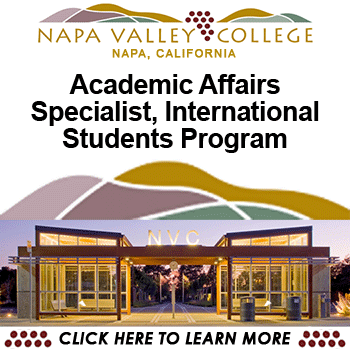
Technical Director/Scenic Designer
Job Description
Application Instructions:
- Complete all sections and fields on the application and attach all required documents – incomplete applications may not be considered.
- Include all relevant education, training, and/or experience on the application.
- Do not include any personally identifiable, confidential, or otherwise unrequested information that does not pertain to job related factors (e.g., social security number, date of birth, pictures, etc.) on your application or attached documents.
- For job postings with a close date, all applications received by 11:59 PM (Pacific Time) on the job posting close date, will receive consideration.
- For job postings with an initial screening date, all applications received by 11:59 PM (Pacific Time) on the job posting initial screening date, will receive priority consideration; however, typically the job posting will remain open, and continue to accept applications, until the position is filled.
- For job postings requiring professional references, include at least three (3) professional references from the following categories:
- Current department chair(s) (for faculty) or supervisor(s);
- Previous department chair(s) (for faculty) or supervisor(s) (from within the past five (5) years);
- Master’s thesis or Doctoral Dissertation advisor or supervisor (for faculty);
- Colleague(s) or co-worker(s) who can address professional competency and skills relevant to the position; and/or
- Other professional references.
Please note, professional references are typically contacted when a candidate is selected for, or as a finalist for, a position.
Description
Class specifications are intended to present a descriptive list of the range of duties performed by employees in the class. Specifications are not intended to reflect all duties performed within the job.
SUMMARY DESCRIPTION
Under direction of the appropriate level supervisor or manager, plans, oversees, and coordinates all technical aspects of the staging of college, guest artist, school, and community performing arts performances; provides lead functional and technical guidance and oversight to stage and student crews involved in the technical aspects of productions and events; ensures proper integration of lighting, sound, staging, set, and any/all technical elements of assigned productions and events in designated performance spaces; collaborates with others to oversee the production schedules, student events, and budget for performing arts productions; designs and coordinates scenic elements for performing arts productions, as assigned. Performs complex technical work in an instructional learning environment including assisting in the preparation of materials and demonstrations for assigned instructional area; provides a high level of academic assistance to assigned faculty; coordinates assigned activities with faculty, staff, students, and others.
REPRESENTATIVE DUTIES
The following duties are typical for this classification. Incumbents may not perform all of the listed duties and/or may be required to perform additional or different duties from those set forth below to address business needs and changing business practices.
Collaborates with the faculty, staff, and students to identify and coordinate activities related to all technical needs for successful completion of performing arts productions, activities, projects, and events; clarifies and determines technical needs and equipment and establishes timetables.
Determines support personnel needed; participates in the selection of assigned students and staff; collaborates with faculty to make student and crew assignments; participates in, plans, prioritizes, assigns, oversees, and reviews the work of assigned staff and students involved in the setup of all technical systems and house equipment (including sound and lighting systems) as well as those involved in construction, painting, rigging, load-in, and strike of scenic elements; works with faculty and staff during technical rehearsals to ensure that all student crews are trained at assigned positions and that technical rehearsals are run effectively and correctly.
Assists faculty with instructional programs; collaborates with faculty to ensure that shops are operated in such a way as to provide the best environment to successfully achieve Student Learning Outcomes; recommends, implements, and administers methods and procedures to enhance operations of the laboratory (shop); participates in the planning and implementation of laboratory (shop) exercises and experiments in collaboration with faculty; collaborates with faculty and staff to research, introduce, and use new technology, materials, and processes in student labs pertinent to the area of assignment; creates various shop drawings and schematics for student use in the construction and set-up of scenery and props; assists students in the use of shop equipment and tools; ensures student compliance with shop policies, procedures, and safety precautions.
Demonstrates proper care for shop equipment and tools; ensures the maintenance of shop areas in a clean and orderly manner; ensures all technical equipment and systems operate effectively during productions, events, and student labs; oversees and coordinates the troubleshooting, repair, and maintenance of theatrical staging equipment and facilities; maintains a preventive maintenance program.
In collaboration with the Lighting/Sound Designer, oversees, coordinates, and integrates the technical elements of productions including theatrical lighting, sound, video sets, and other items as required.
Coordinates with managers, faculty, staff, and students the strike and return of all technical equipment.
Maintains inventory of materials and equipment necessary for the shop and performance spaces; recommends equipment purchases.
Works with managers, supervisors, faculty, and staff to monitor production costs; oversees and monitors budgets as related to the technical aspects of performing arts productions and events; collaborates with staff and faculty to develop working budget for productions; provides recommendations to reduce cost in production shops.
Attends a variety of meetings, workshops, conferences, presentations, and training sessions as required; maintains compliance with mandatory trainings and certifications as directed by supervisor; attends and participates in diversity, equity and inclusion trainings and events.
Fosters a collaborative and inclusive environment that promotes creativity and professionalism; establishes and maintains cooperative working relationships with students, staff, and faculty, as well as various outside groups to ensure efficient, effective, and correct implementation of school/departmental objectives.
Maintains assigned area(s) in a safe, clean, and orderly environment; assures compliance with established safety procedures and regulations; refers unresolved problems to supervisor.
Uses District, College, State, and Federal regulations, policies, and procedures to provide accurate information to students, staff, faculty, and others; abides by all confidentiality practices required by department, state, and federal policies, laws, rules, and regulations; adheres to and enforces procedures and guidelines.
May perform the duties of lower-level classifications within the area of assignment, as needed.
Performs related duties, as required.
QUALIFICATIONS
The following generally describes the knowledge and ability required to enter the job and/or be learned within a short period of time in order to successfully perform the assigned duties.
Knowledge of:
College performing arts programs, events, productions, and other activities.
Technical aspects of performing arts productions, including lighting, scenery design, costume design, and construction techniques.
Various performing arts equipment including rigging, lighting and sound systems, and related machinery.
Technology used in theatrical production and Computer Aided Drafting (AutoCAD or Vector Works and Mac Platform).
Steel welding and metal working as it relates to theatrical construction.
Materials and processes used in the construction of scenery for venues other than theatre, such as television, film, theme parks, etc.
Automated scenery, motors, and computer control of rigging and scenery.
Principles and practices of performing arts design and technical production.
Methods and techniques used in the production of events.
Pertinent federal, state, and local laws, codes, and regulations including applicable sections of the State Education Code and other legal requirements related to area of assignment.
Philosophy, operational characteristics, services, activities, goals, and objectives of the assigned area; specialized functions, activities, operations, rules, regulations, requirements, and restrictions related to the area of assignment; terminology, techniques, equipment, materials, principles, theories, practices, and procedures related to the area of assignment.
Office procedures, methods, and equipment including computers, specialized hardware, and applicable software applications.
Principles and practices of budget preparation and administration including time, material, and labor cost estimating.
Principles, practices, and procedures of fiscal, statistical, and administrative research and report preparation.
Principles and practices of performing arts safety.
English usage, grammar, spelling, punctuation, and vocabulary.
Office procedures, methods, and equipment including computers and applicable software applications.
Work organization principles and practices.
Effective written and oral communication skills in English.
Diverse academic, socioeconomic, cultural, disability, and ethnic backgrounds of community college students.
Interpersonal skills using tact, patience, and courtesy.
Techniques to facilitate effective interaction with people on an individual or group basis.
Confidentiality requirements when dealing with personal and sensitive student information.
Occupational hazards and standard safety policies and procedures.
District and College organization, operations, policies, and objectives.
Principles and practices of providing training and guidance to lower-level staff and
student workers.
Ability to:
Design and construct theatrical scenery and props using a variety of materials, including wood, metal, plastics, etc.
Translate drawings and sketches into finished constructed scenic elements using effective communication skills.
Prepare drawings, models, and other graphic representations for construction of scenic elements.
Oversee and participate in the construction of scenic elements with staff and students.
Use and operate a variety of hand and power tools as needed to construct scenic elements in a safe and efficient manner.
Draft by computer and hand.
Supervise and train students in the use of the shop and its equipment.
Weld using Mig, Tig, Arc, and Gas rigs.
Work with student crews of diverse skills, abilities, and knowledge, including students with disabilities.
Effectively utilize computer applications and equipment in the performance of duties; adapt to changing technologies and learn functionality of new equipment, programs, and systems as they evolve.
Learn and understand the organization and operation of the assigned department as necessary to assume assigned responsibilities; understand, explain, and apply administrative and office policies and procedures as well as pertinent laws, regulations, and ordinances; work within the policies, functions, and requirements of area of assignment.
Communicate clearly and concisely, both orally and in writing in English; use correct English usage, grammar, spelling, punctuation, and vocabulary; understand and follow oral and written directions in English; listen actively and effectively.
Develop, maintain, and foster effective working relationships involving interactions and communications personally, by phone, and in writing with a variety of individuals and/or groups from diverse backgrounds on a regular, ongoing basis.
Interact extensively with and respond to requests and inquiries from students, faculty, staff, and the public; effectively present information in person or on the telephone to students, staff, or the public; provide excellent customer service.
Operate office equipment including hardware, software, and devices supporting word processing, database management, and spreadsheets; type or enter data at a speed necessary for successful job performance; research, compile, analyze, and interpret data; maintain accurate filing, record keeping, and tracking systems; apply excellent organization skills and attention to detail; compose and prepare correspondence and memoranda; maintain filing systems; prepare documentation, reports, and other written materials.
Work with and exhibit sensitivity to and understanding of the varied racial, ethnic, cultural, sexual orientation, academic, socio-economic, and disabled populations of community college students.
Work effectively under pressure with frequent interruptions and a high degree of public contact on a variety of tasks concurrently while meeting established deadlines and changing priorities; concentrate on detailed tasks for extended periods of time; work confidentially, independently, and collaboratively.
Exercise good judgment, discretion, and personal initiative in resolving confidential, difficult, and sensitive situations, according to established policies and procedures; use sound judgment in recognizing scope of authority; maintain critical and sensitive information, records, and reports confidentially.
Provide training and work direction to assigned staff, students, and volunteers.
Report to work on a regular and consistent basis, as scheduled, to assigned job.
Maintain the cleanliness, safety, and organization of assigned area; ensure adherence to safe work practices and procedures; monitor activities in assigned area and enforce policies for proper use and behavior.
Participate in trainings and meetings on-site and off-site as required.
Work evening/weekend shifts, as required.
EDUCATION AND EXPERIENCE GUIDELINES
Any combination of education and experience that would likely provide the required knowledge and abilities is qualifying. A typical way to obtain the knowledge and abilities would be:
Education/Training:
A Bachelor’s degree from an accredited college or university with major course work in technical theatre, theatrical design, or related field. and four years of responsible experience in technical theatre, theatre construction, theatre or entertainment production, entertainment construction or its related fields, including one year supervisory or lead responsibility.
Experience:
Four years of responsible experience in technical theatre, theatre construction, theatre or entertainment production, entertainment construction or its related fields, including one year supervisory or lead responsibility.
PHYSICAL DEMANDS AND WORKING ENVIRONMENT
The conditions herein are representative of those that must be met by an employee to successfully perform the essential functions of this job. Reasonable accommodations may be made to enable individuals with disabilities to perform the essential job functions.
Environment: Work is performed in a theatre setting; work near moving mechanical parts; exposure to noise, dust, and inclement weather conditions; works in precarious places; occasionally works around loud noise levels. At least minimal environmental controls are in place to assure health and comfort. Positions may be required to work evenings and weekends.
Physical: Primary functions require sufficient physical ability and mobility to work in an office and theatre setting; to stand or sit for prolonged periods of time; to occasionally stoop, bend, kneel,
crouch, reach, and twist; to lift, carry, push, and/or pull light to moderate amounts of weight; to operate office equipment and various hand and power tools and equipment requiring repetitive hand movement and fine coordination including use of a computer keyboard; and to verbally communicate to exchange information. Vision: See in the normal visual range with or without correction; vision sufficient to read computer screens and printed documents; and to operate assigned equipment.
Hearing: Hear in the normal audio range with or without correction.Supplemental Information
If you have prior related experience in accordance with the job description please attach your design portfolio. If this is not applicable, attach a blank document.
Initial Screening Date: October 28 , 2024
Range 132 of the CSEA Salary Schedule
Work Schedule: Monday - Friday (8:00 AM - 5:00 PM) - Schedule and shift are subject to change in accordance with the department's needs.
Hours per Week: 40
Months per Year: 12
Special COVID-19 Notice:
Interviews may be held in-person (following all necessary precautions) or in a virtual format. Employees must reside in California while employed with the South Orange County Community College District (SOCCCD), even during offsite work.
The SOCCCD is committed to protecting the health and wellbeing of students, faculty, staff, managers, and the communities it serves. More information can be found on the SOCCCD website by visiting https://www.socccd.edu/communications/covid-19-information.
Notice to all Candidates for Employment:
The Immigration Reform and Control Act of 1986, Public Law 99-603, requires that employers obtain documentation from every new employee which authorizes that individual to accept employment in this country. The SOCCCD will not sponsor any visa applications.
California Public Employees Retirement System and California State Teachers Retirement System:
A California Public Employees Retirement System (CalPERS) retiree may not accept employment until after the first 180 days of retirement. Anyone retired from CalPERS accepting permanent employment with the SOCCCD will be required to reinstate as an active CalPERS member. Please contact CalPERS for additional information regarding your retirement status.
Any active vested member of California State Teachers Retirement System (CalSTRS), who accepts employment with the SOCCCD to perform service that requires membership in CalPERS, is eligible to elect to continue retirement system coverage under CalSTRS
Disability Accommodations:
If you require special accommodations in the application and/or evaluation process, please notify Human Resources at least two (2) business days prior to the job posting close or initial screening date, by either calling (949) 582-4850 or sending an e-mail to hrinfodesk@socccd.edu.
Attendance Requirement:
All SOCCCD employees are required to report to work on a regular and consistent basis, as scheduled, to assigned job.
Campus Crime and Safety Awareness:
Information regarding campus crime and safety awareness can be found at www.ivc.edu or www.saddleback.edu. Paper copies are available in the Human Resources office upon request.
Diversity, Equity, Inclusion and Equal Employment Opportunity:
The SOCCCD is committed to creating an academic and work environment that fosters diversity, equity, and inclusion (DEI) and equal employment opportunity (EEO) for all, and ensures that students, faculty, staff, and managers of all backgrounds feel welcome, included, supported, and safe. Our culture of belonging, openness, and inclusion, makes the SOCCCD a unique and special place for individuals of all backgrounds.
The SOCCCD is looking for equity and inclusion-minded applicants who represent the full diversity of California and who demonstrate a sensitivity to the understanding of diverse academic, socioeconomic, cultural, disability, gender identity, sexual orientation, and ethnic backgrounds present within our community. When you join the SOCCCD, you can expect to be part of an exciting, thriving, equity-focused, and inclusive community that approaches higher education with the lens of social justice and collaboration among students, faculty, staff, managers, and community partners. In deciding whether to apply for a position at the SOCCCD, you are strongly encouraged to consider whether your values align with the SOCCCD's mission and goals for DEI and EEO.
THE SOCCCD IS AN EQUAL OPPORTUNITY EMPLOYER
*Please mention you saw this ad on CaliforniaCareers.*
Be Seen By Recruiters at the Best Institutions
Create a FREE Profile to be Seen!






